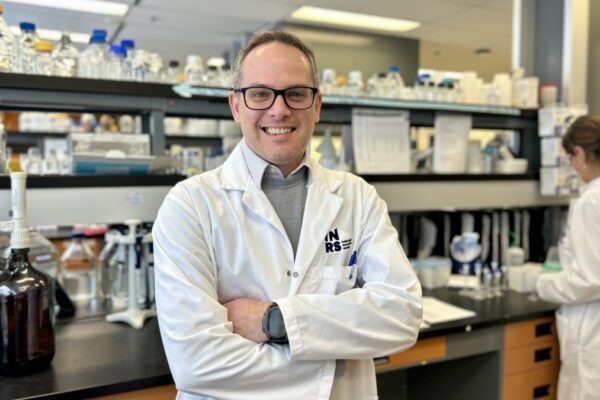- Research
Over $4 million for cutting-edge infrastructure at INRS.

From left to right: M. David Chatenet – Director, INRS Armand-Frappier Santé Biotechnologie Research Centre, M. Stéphane Boyer, mayor of Laval, M. Luc-Alain Giraldeau -Chief Executive Officer of INRS, M. Christopher Skeete – Minister for the Economy, Minister responsible for the Fight against Racism, and Minister responsible for the Laval region, Mrs Céline Haytayan, deputy for Laval-des-Rapides and M. Laurent Chatel-Chaix – Professor and head of the Containment Level 3 (CL3) Laboratory at INRS
As the climate continues to change, insect-borne viruses—also known as arboviruses—are becoming a growing threat to public health around the world. These viruses, which are spread and transmitted by mosquitoes, ticks, and flies, could be the source of future epidemics or pandemics in Quebec and the rest of Canada. Some of them are already in the World Health Organization’s sights.
The Institut national de la recherche scientifique (INRS), a leader in the fight against infectious diseases, has received $4,163,688 in funding from the Quebec government to technologically develop an innovative research pipeline in its Containment Level 3 (CL3) laboratory on the INRS Armand-Frappier Santé Biotechnologie Research Centre in Laval. Today’s announcement is a major boon for biotech sector.

“This major investment strengthens INRS’s position as a hub of expertise in health and biotechnology in Quebec and the rest of Canada. This will provide our institution with state-of-the-art facilities to take on current public health challenges, while helping to train the next generation of scientists specialized in infectious diseases.”
Luc-Alain Giraldeau, Chief Executive Officer of INRS
CL3 infrastructure allows pathogens that may be hazardous to human and animal health to be handled and studied under infectious and highly secure conditions.
“By supporting this INRS project, we are affirming the importance of Quebec in research and innovation. This support contributes to making Laval a major center for biotechnology and health, and we are proud to see our region shine in these essential fields.”
Christopher Skeete, Minister for the Economy, Minister responsible for the Fight against Racism, and Minister responsible for the Laval region
A better understanding of arboviruses
Professor Laurent Chatel-Chaix, a molecular virologist at INRS who heads the CL3 laboratory since 2021, will be working with his team to perform cutting-edge research on arboviruses like West Nile virus, chikungunya, Usutu, and yellow fever.

“Arboviruses are potential sources of epidemics and pandemics, especially since they are influenced by the effects of global warming in some parts of the world. The technological innovation of this CL3 facility will allow us to deepen our knowledge of certain diseases and better understand how these viruses spread while preparing for future pandemic and epidemic threats.”
Laurent Chatel-Chaix, Professor and head of the Containment Level 3 (CL3) Laboratory at INRS
Professor Chatel-Chaix notes that it is essential to monitor the presence of viruses in the Canadian insect population in order to remain alert to any possible emergence of “threats on our doorstep.” This includes as-yet-unidentified arboviruses that could emerge at any time. There is also a pessimistic, yet realistic, possibility that, in the longer term, the melting of the permafrost could lead to the resurgence of ancient viruses we know nothing about.
“Thanks to the research that will be done in this laboratory, we anticipate that if an arbovirus causes a pandemic in the future, we will have all the tools we need to understand and fight this threat,” explains the researcher.
Cutting-edge equipment
The new, state-of-the-art equipment will complement the existing CL3 infrastructure and will allow for a continuum of virology research at multiple scales, ranging from the entire infected host to the molecular level. This will help our scientists better understand how diseases develop and spread.
“Generally, when we examine cells infected with a Risk Group 3 virus, we have to inactivate them, or kill them before any downstream analysis,” explains Professor Chatel-Chaix. “Now, not only will we be able to study the mechanisms of the virus in living cells in real time, but we will even be able to test thousands of drugs on a disease at once, under ‘native’ infectious conditions.”

“A laboratory of this calibre will be a true springboard for major advances in virology and infectious diseases. Our research efforts are part of a global approach to health that the Centre has been following for some years now.”
David Chatenet, Director, Armand-Frappier Santé Biotechnologie Research Centre
The Containment Level 3 laboratory will also be equipped with a liquid effluent treatment system, enabling researchers to work with non-indigenous Risk Group 3 pathogens and/or pathogens that require a high level of biosafety, such as MERS-CoV, Japanese encephalitis virus, and Rift Valley fever virus.
“There are several Level 3 laboratories in Quebec, but to have this set of new equipment is quite exceptional. It will really let us broaden our scope and innovate,” concludes Professor Chatel-Chaix.
Quebec Governement presse release



